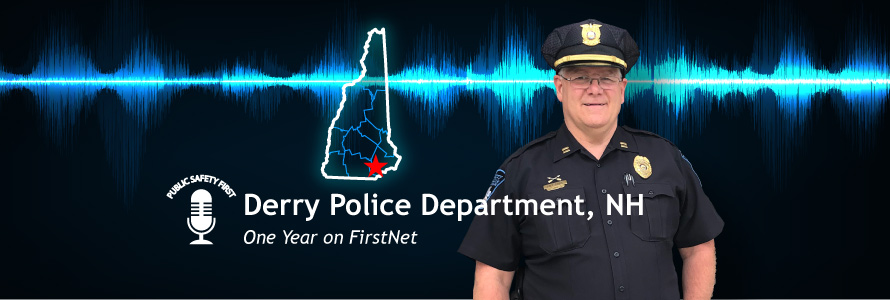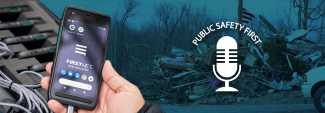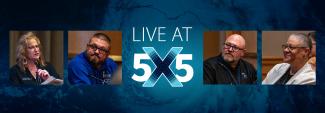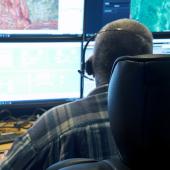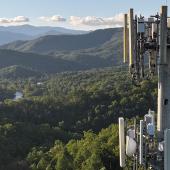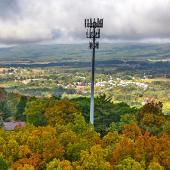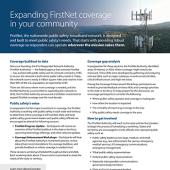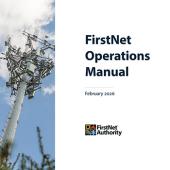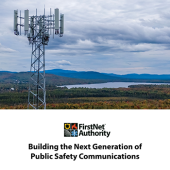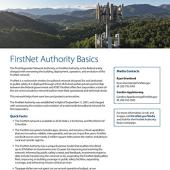Summary
With FirstNet's reliable broadband connection, Derry police officers are always connected and able to extend their LMR footprint.
Guest
Gary McCarraher
FirstNet Authority Senior Public Safety Advisor
Captain George Feole
Derry Police Department, New Hampshire
Transcript
Preview
Narrator: You're listening to Public Safety First, a podcast to help you learn about the First Responder Network Authority and how you can be part of the future of public safety technology.
And now, your host.
Gary McCarraher: Welcome to the Public Safety First podcast. I’m Gary McCarraher, and I serve as a Senior Public Safety Advisor for the FirstNet Authority. I’m joined today by Captain George Feole of the Derry Police Department (PD). Derry PD was the first municipal agency in New Hampshire to implement FirstNet. In fact, this marks their one-year anniversary since adopting FirstNet.
We’re pleased to have you, Captain Feole, to join us today, and I welcome you to the podcast.
Capt. George Feole: Thank you, happy to be here.
Gary McCarraher: Great. So can you tell us a little bit about yourself and your career in policing?
Narrator: You're listening to Public Safety First, a podcast to help you learn about the First Responder Network Authority and how you can be part of the future of public safety technology.
And now, your host.
Gary McCarraher: Welcome to the Public Safety First podcast. I’m Gary McCarraher, and I serve as a Senior Public Safety Advisor for the FirstNet Authority. I’m joined today by Captain George Feole of the Derry Police Department (PD). Derry PD was the first municipal agency in New Hampshire to implement FirstNet. In fact, this marks their one-year anniversary since adopting FirstNet.
We’re pleased to have you, Captain Feole, to join us today, and I welcome you to the podcast.
Capt. George Feole: Thank you, happy to be here.
Gary McCarraher: Great. So can you tell us a little bit about yourself and your career in policing?
Capt. George Feole: Sure. I started in my career in 1980. Actually, I began a little bit before that. I lived in a community – Methuen, Massachusetts – when I grew up, and I joined the auxiliary police in Methuen in 1977, so I actually go back a little further than 1980. That’s a part-time, unpaid position –
Gary McCarraher: Sure.
Capt. George Feole: – but I realized when I was a young man in my teens that I wanted to enter police work. I had a passion for it and I wanted to do that as a career. So, I sought that path and I did that. The Town of Derry hired me in 1980. Since then, I’ve been a police officer here. I’ve been involved in a number of different areas, and I’ve had the good fortune to have been able to build two radio systems for the Town of Derry – LMR [land mobile radio] radio systems. I’ve always had a passion for two-way communications. I’m actually a licensed ham radio operator.
Presently, I serve as the commander of the Support Services Division, Captain in charge of all of the administrative support functions in the police department.
Gary McCarraher: Okay. Tell us a little bit about the department.
Capt. George Feole: Well, the Town of Derry is the fourth largest community in the state of New Hampshire with about 33,000 residents. We have 59 sworn police officers on our staff and about 15 or 16 civilian staff.
Gary McCarraher: Okay. In addition to just providing services within the Town of Derry, you guys also participate in a lot of regional activity. Can you go into that for us?
Capt. George Feole: We do. The Town of Derry participates in the regional HAZMAT [hazardous materials] district.
Gary McCarraher: Mmhmm.
Capt. George Feole: I think there’s 18 or 19 communities in that district in the southern part of the state here, and we also participate in the Southern New Hampshire Special Operations Unit, which is a regional SWAT team. There are 11 communities in that regional response team.
Gary McCarraher: Okay, and what’s the nature of their activities?
Capt. George Feole: Well, it’s a first response SWAT unit for any agency within those 11 communities.
Gary McCarraher: Okay, great. So, in October of 2018, the Derry PD transitioned to FirstNet. Why did you choose to join the network, and how was the migration from what you used before to FirstNet?
Capt. George Feole: Well, first of all, the migration was seamless. It was just switching from one carrier to FirstNet, and it was, all the devices were switched over, and the folks at AT&T were extremely helpful in managing that migration for us.
Gary McCarraher: So was there a catalyst for your change?
Capt. George Feole: There was. One of my duties is I sit on the Statewide Interoperability Executive Committee, so I’m very familiar with the process of FirstNet and the state becoming a FirstNet state, if you will, when they opted in. As soon as we opted in, I began the process of working with our town IT [information technology] staff, who manages all of our broadband devices in the community, if you will, and working with them to see if this was feasible for us to become a FirstNet community. And the reason I want to do that is because one of the functions that I take care of here at the police department is communications, and I want to afford our staff, our officers, the latest and the greatest technology available to assist them in doing their job safely and efficiently.
One of the first things I learned in a time of crisis is the first thing to break down is communications, and if we lose communications, whether it be two-way LMR, whether it be a telephone conversation, whether it be face-to-face communications, if you lose communication ability, you lose the ability to manage the situation. I’ve had the good fortune in my career to have been a consultant for the Department of Homeland Security in the past, and I’ve traveled all across this country doing homeland security exercises in the terrorism realm, in the health and human services realm with H1N1 flus, it really wouldn’t matter the scenario, and I learned that if something’s going to go wrong, it’s going to be, the first thing is going to be communications. So, I’ve always had a passion for communications. I think FirstNet is going to solve a lot of problems that we’ve experienced in the communications world in law enforcement and public safety in this country.
Gary McCarraher: As we run through the circles here in New Hampshire, you know, we hear a lot about FirstNet in the large-scale emergencies, but on a day-in and day-out basis, it makes an impact, too, and there’s a really great case study I’ve been told of here in Derry.
Capt. George Feole: There is. You know, we’ve been using broadband devices in law enforcement for many, many years, but recently, with the carrier we had prior to FirstNet, we were experiencing some service drops with respect to my broadband devices in the cruisers, the mobile computers. Every day, at about, well, every day at two o’clock, our high school lets out, and that high school is the largest high school in the state – 3,300 students and about 500 staff members, 5 to 600 staff members. So every day at two o’clock, as you imagine, the high school crowd breaks out their cell phone or their broadband device and gets online. The staff members do the same thing. So, the towers in our community were simply overwhelmed, and the carrier that we had before didn’t have the capacity to take up all of those users at once. So, my staff shift changes at three o’clock in the afternoon, so, at two-thirty in the afternoon, our officers would start rolling into the police station to get ready for shift change and they’d sign off on the computers. The oncoming shift would come on and try to sign on to the computers and they couldn’t because there was no capacity, no bandwidth. So, that would last until probably six, six-thirty, when the evening rush hour was over, before capacity freed up that would allow our officers to sign on to the computers.
So we had a period in every day, during the school season, every day where our officers were offline from two o’clock, two-thirty ‘til six, six-thirty in the evening.
Gary McCarraher: My goodness.
Capt. George Feole: And, so, when we switched over to FirstNet and AT&T FirstNet, since then, we’ve had one hundred percent connectivity, one hundred percent of the time.
Gary McCarraher: Wow, so, that really is the poster child for priority, preemption in a congested environment.
Capt. George Feole: It absolutely is. We are always online, always connected now.
Gary McCarraher: Very good, thank you. So, now that you’ve been on the network for a full year, can you tell us about what your experience has been during that time?
Capt. George Feole: Well, as I said, the biggest thing is the connectivity in the cruisers. We have a hundred percent connectivity, hundred percent of the time. Our officers are never without connection. So, we use them extensively for that. And now, the data speeds, much, much faster than we enjoyed on our previous carrier, so that’s a plus. The officers enjoy that. We also use FirstNet modems in our cruisers to transmit data on GPS locations to a server we have here at the police station with a large map displayed in our dispatch center, so that we monitor and watch – in real time, nearly real time, every ten-second report, ten-second cadence on the reporting – we can see our cruisers driving around in the community, no matter where they are actually. Doesn’t have to be within the bounds of Derry, it’s anywhere on the map.
Gary McCarraher: Sure, so closest, most appropriate really always happens here in Derry?
Capt. George Feole: Yes.
Gary McCarraher: Outstanding. So, what’s the feedback you’re hearing from the folks in the street, your patrol officers?
Capt. George Feole: The feedback is they love it. In fact, a lot of them have gone out and become subscriber-paid FirstNet customers now as a result.
Gary McCarraher: Wow, wow. So, I know you also have a robust use of the radio over IP through the FirstNet network. Can you explain that for us?
Capt. George Feole: Sure. Through the AT&T EPTT [enhanced push-to-talk] app, I worked with AT&T folks and I obtained a gateway, if you will, for the radio over IP [internet protocol]. It’s a cubic locality box. It has four channels. So, I have worked with my local radio vendor here in New Hampshire, and we were able to tie that into my Motorola radio consoles in dispatch, and my Motorola radio system in general, so that I have my main police channel, my main fire channel in the community, and then I have two multi-channel radios tied to the rig kit, as well, that allow me to ask my dispatcher to select any one of a number of stations, it could be the neighboring police department, Londonderry PD, or the neighboring to our south Salem Police Department, or one of their fire departments, I can tune up any one of those channels and talk to that LMR network through my broadband device.
Gary McCarraher: Wow, and do you have any issues with latencies or anything of that nature?
Capt. George Feole: Nothing that’s going to affect us operationally.
Gary McCarraher: Okay.
Capt. George Feole: I treat it just like a two-way radio.
Gary McCarraher: Very good, very good. So, has that level of interoperability used fairly regularly?
Capt. George Feole: Mostly for monitoring traffic when we’re out of the LMR footprint.
Gary McCarraher: Yeah.
Capt. George Feole: So, what the broadband interface does is it extends our LMR footprint, anywhere in the world where there’s cellular coverage, really. And recently I was down in Virginia visiting my daughter, and I was able to talk and listen to the Derry Police Department radio frequency here in New Hampshire. So, it’s very, very efficient.
Gary McCarraher: So, it really does expand the footprints of situational awareness for you.
Capt. George Feole: Exactly.
Gary McCarraher: Yeah. Okay, great. Now that you’ve been on for a year, look out for the next five years. Where do you think this technology can be applied to the field for you?
Capt. George Feole: Well, quite honestly, I see the officers, where officers now are tied to their computers to write reports in the cruiser, in the future – in the very near future – we’re going to be able to submit reports from a handheld device anywhere in the field. Right now, our CAD [computer-aided dispatch] vendor and our RMS [records management system] vendor are developing apps to use on a broadband device that will allow officers to catalog evidence in the field, take pictures and tie it right to the reports, and catalog the entire crime report right on the handheld device.
Gary McCarraher: And again, not being a police person, that sounds like it makes it more efficient, but what’s the direct benefit of that?
Capt. George Feole: The direct benefit is a huge time savings to the officer’s daily routine of writing reports, conducting an investigation.
Gary McCarraher: Okay. As we close up today, it sounded like you had a pretty seamless transfer from your old carrier to FirstNet. Is there any advice that you can give other police departments to make sure that their experience goes as seamlessly?
Capt. George Feole: Work with your AT&T FirstNet consultant, work with yourself as a FirstNet representative to ensure that everything is thought and planned ahead of time as far as what devices you want to use, what devices in the cruisers, what modems, whether they’re Band 14 capable – that’s a big consideration. Make sure that you take advantage of the latest technology. Band 14 is out there, so let’s use it.
Gary McCarraher: Okay. Is there anything else that you want to share with the listeners today?
Capt. George Feole: I will just say this about FirstNet – there are applications in development and there are things coming down the pike that we can’t even imagine today sitting here, and it’s going to make our jobs much easier as we move forward.
Gary McCarraher: Well, thank you very much for joining us today. It’s been a pleasure talking to you.
Capt. George Feole: Thank you for having me.
Narrator: Thanks for listening today. We're excited to have you join our podcast community. Make sure to subscribe on iTunes, SoundCloud, and YouTube. You can learn more about the First Responder Network Authority at FirstNet.gov and learn about FirstNet products and services at FirstNet.com.


